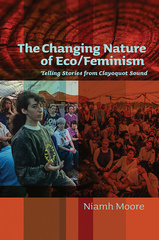
Environmental issues are moving from the margins to the centre of discussion and debate in Canada, as conflicts over fisheries, forests, farming practices, and climate-change policy are brought to our attention daily. What can the experiences of environmental activists and other actors tell us about the nature of our democracy and our abilities, as citizens, to achieve a socially just and ecologically sustainable society?
The contributors to this path-breaking collection argue that environmental conflicts are always about our rights and responsibilities as citizens and the quality of our democratic institutions and offer sixteen case studies that range from First Nations resistance to the coastal fisheries crisis, to regulatory battles over genetically modified crops, to the implications of suburban sprawl. These essays bring the perspectives of science, environmental justice, social movement theory, and institutional design to bear on environmental conflicts, provide a critical assessment of green democratic theory, and present the case for a Gramscian understanding of environmental politics.
By grounding theory in empirical study of the discourses and practices of social actors, political economy, and institutions, Environmental Conflict and Democracy in Canada charts a new course for research in environmental citizenship. It is essential reading for anyone interested in political ecology and the environmental challenges we now face.
In a review of three recent books on environmental policy, including Environmental Conflict and Democracy in Canada, Graeme Auld, Carleton University, School of Public Policy and Administration, says: 'Taken together, these volumes are an invaluable contribution to our understanding of the complex challenges environmental problems, new and old, present, even in advanced industrial countries.
This book helps reorient environmental discussions in Canada away from standard revisionist policy approaches toward a deeper consideration of how democratic aspirations can push back against the tight policy monopolies that control the environmental agenda in Canada. This perspective is absolutely central to addressing [our country’s] environmental problems.
Laurie E. Adkin is an associate professor of comparative politics in the Department of Political Science at the University of Alberta.
Contributors: Peter Andrée, Patricia Ballamingie, Darren R. Bardati, Nathalie Berny, Colette Fluet, Jason Found, Liette Gilbert, Donna Harrison, William T. Hipwell, Raymond Hudon, Naomi Krogman, Susan W. Lee, Michael Mascarenhas, R. Michael M’Gonigle, Jane Mulkewich, Richard Oddie, Maxime Ouellet, James Overton, John R. Parkins, L. Anders Sandberg, Lucy Sharratt, Martha Stiegman, Cheryl Teelucksingh, and Gerda R. Wekerle
Preface / Laurie E. Adkin
1 Ecology, Citizenship, Democracy / Laurie E. Adkin
2 Unsatisfactory Democracy: Conflict over Monsanto’s Genetically Engineered Wheat / Peter Andrée and Lucy Sharratt
3 Regulating Farm Pollution in Quebec: Environmentalists and the Union des producteurs agricoles Contest the Meaning of Sustainable Development / Nathalie Berny, Raymond Hudon, and Maxime Ouellet
4 Modern Enclosure: Salmon Aquaculture and First Nations Resistance in British Columbia / Donna Harrison
5 Fisheries Privatization versus Community-Based Management in Nova Scotia: Emerging Alliances between First Nations and Non-Native Fishers / Martha Stiegman
6 First Nations, ENGOs, and Ontario’s Lands for Life Consultation Process / Patricia Ballamingie
7 Participation, Information, and Forest Conflict in the Slocan Valley of British Columbia / Darren R. Bardati
8 The Limits of Integrated Resource Management in Alberta for Aboriginal and Environmental Groups: The Northern East Slopes Sustainable Resource and Environmental Management Strategy / Colette Fluet and Naomi Krogman
9 Environmental Conflict and Democracy in Bella Coola: Political Ecology on the Margins of Industria / William T. Hipwell
10 Privatization, Deregulation, and Environmental Protection: The Case of Provincial Parks in Newfoundland and Labrador / Jim Overton
11 Managing Conflict in Alberta: The Case of Forest Certification and Citizen Committees / John R. Parkins
12 Beyond the Reach of Democracy? The University and Institutional Citizenship / Jason Found and R. Michael M’Gonigle
13 The Myth of Citizen Participation: Waste Management in the Fundy Region of New Brunswick / Susan W. Lee
14 Neo-liberalism, Water, and First Nations / Michael Mascarenhas
15 Contesting Development, Democracy, and Justice in the Red Hill Valley / Jane Mulkewich and Richard Oddie
16 Instant Gentrification: Social Inequality and Brownfields Redevelopment in Downtown Toronto / Cheryl Teelucksingh
17 Taking a Stand in Exurbia: Environmental Movements to Preserve Nature and Resist Sprawl / Gerda R. Wekerle, L. Anders Sandberg, and Liette Gilbert
18 Democracy from the Trenches: Environmental Conflicts and Ecological Citizenship / Laurie E. Adkin
References
Index








